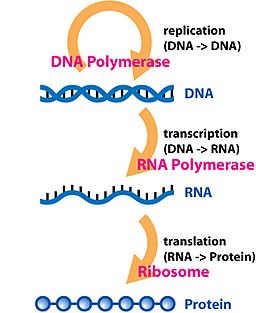 |
| Picture source: Wikimedia |
The central dogma of molecular biology is a term coined by Francis Crick to describe the flow of genetic information in living organisms. This flow of information is essential for the functioning of all cells, and is the basis for many of the fundamental processes of life, such as growth, development, and reproduction.
The central dogma of molecular biology states that genetic information flows from DNA to RNA to protein. This process begins with the transcription of DNA into RNA, which is carried out by enzymes called RNA polymerases. RNA polymerases bind to specific sequences in the DNA called promoters, and then use the DNA as a template to synthesize an RNA molecule that is complementary to the DNA.
This RNA molecule, also known as messenger RNA (mRNA), is then used as a template for the synthesis of a protein molecule. This process, known as translation, is carried out by ribosomes, which are cellular structures that are responsible for protein synthesis. The ribosome reads the sequence of nucleotides in the mRNA, and uses this information to synthesize a protein molecule with a specific sequence of amino acids.
The flow of genetic information from DNA to RNA to protein is essential for the functioning of all cells. DNA contains the genetic information that is required for the synthesis of all of the proteins that are necessary for life. The process of transcription and translation allows cells to produce the proteins that they need in order to carry out their functions.
The central dogma of molecular biology has been supported by a wealth of experimental evidence, and it is considered to be one of the fundamental principles of molecular biology. It has also been extended and refined over time to include additional details about the process of gene expression, such as the role of regulatory elements and the mechanisms by which genes are turned on and off.
In addition to its importance in molecular biology, the central dogma has also had a significant impact on other fields of science, such as medicine and biotechnology. For example, the ability to manipulate the flow of genetic information has led to the development of powerful new tools for studying and treating genetic diseases, as well as for producing valuable proteins and other biomolecules for use in research and industry.
The central dogma of molecular biology is a key concept that helps to explain how genetic information is used and transmitted in living organisms. It is a fundamental principle that has had a profound impact on our understanding of the basic processes of life, and continues to be an important area of research in the field of molecular biology.
